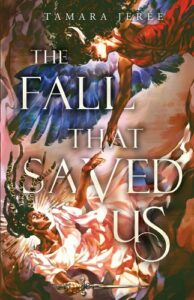The author’s content notes, which also apply to this review: “While Cassiel’s story is focused on healing, heavier themes of trauma and shame are explored to give context to the protagonist’s journey. Please consider the major content notes: cutting scars, brief self-harm ideation, discussion of an eating disorder, family emotional abuse, and a manipulative mother. This book contains sexual content and is only intended for adult readers.”
The first time I learned about Tamara Jerée’s The Fall That Saved Us, I was sold. A sapphic paranormal romance with a protagonist who runs a bookstore and heals from trauma? That sounded like the perfect way to ring in October. I’m happy to say that not only did it meet my expectations, but it became a favorite of the year.
Cassiel has cut off ties with her divine family of demon hunters, other than her sister, with whom she now has a complicated relationship. She has spent the last three years living in the ordinary world for the first time, trying to establish a life independent of the oppressive rules of her mother, Gabriel. She runs a bookstore and is friends with Ana, a witch with a coffee shop. Still, she won’t fully open up even to Ana, and she has struggled to integrate into society or unpack her internalized shame, as she was raised to avoid pleasure of any kind.
Though Cassiel is laying low, she attracts the attention of the succubus Avitue, who has been ordered to steal Cassiel’s soul. Avitue haunts Cassiel, attempting seduction through gifts and shared dreams. But by the time the two meet face-to-face, Avitue has realized that Cassiel is more than meets the eye, as someone who has been harmed by her family and is trying to escape the life of a demon hunter. Ordinarily, a confrontation between a succubus and an angel’s descendant ends in violence, but they both exercise restraint. This gives them enough pause that they develop a tentative trust and a less tentative chemistry. When Cassiel’s family gets involved at the same time that Avitue’s superiors apply pressure, they must team up to navigate these threats while also navigating their feelings.
A whirlwind romance with a succubus pushes Cassiel out of her comfort zone in more ways than one, forcing her to confront the idea that demons are more complex than her family claimed and allowing her to embrace sensuality for the first time. Initially, going against her conditioning makes her recoil. However, Avitue understands that it’s important for Cassiel to push herself toward new ground on her own terms. When she falls, Avitue is there to catch her.
As an immortal succubus who fell millennia ago, Avitue is chaotic, morally grey, and distant from humanity. She is electrifyingly charismatic and doesn’t mind wielding this as a tool. However, coming into contact with Cassiel forces her to question her own assumptions about their natures. From the start, Avitue cares for and refuses to hurt Cassiel. Their developing relationship involves all of the negotiation and communication that this sort of dynamic requires, without shying away from the darker aspects of Avitue’s life.
The theme of healing from trauma, especially religious trauma and familial abuse, stood out to me the most. Cassiel is reclaiming her own body, her own divinity, and her own experience with the world. As she explores all of the things she was denied, she finds that rather than being cut off from her power as her mother had claimed, she is actually growing more fully into herself. The narrative is a celebration of love, warmth, and tenderness, and an indictment of forcing people to sacrifice parts of themselves in order to fit into narrow boxes.
This book understands that healing is not linear. Cassiel has already spent years living out in the world, but she still hides herself away from it, and she relapses into shame when she experiences attraction, enjoys food, or tries to wear nice clothing. Because she has people who genuinely care about her, she is able to pick herself back up when she falls. Healing may not be a straight path, but time marches onward, and so does she.
As someone who hasn’t read a lot of paranormal romance, the pacing of some books can require adjusted expectations, with characters who’ve only known each other a short time falling in literally eternal love. However, I realize this is a genre convention borne of the combination of high-octane plots and immortal characters, and that this type of story asks for suspension of disbelief. What’s important is that I bought into these particular characters’ dynamic given their circumstances. The story calls for a breathless intensity that the book delivers on. I was also impressed with the layered ending, as the book’s complex conflicts weren’t wrapped up in a tidy bow after one event.
An additional note that made this nonbinary reader happy: while the synopsis refers to both characters as women, Avitue doesn’t feel a connection with the concept of gender due to her experiences as a succubus. Being nonbinary doesn’t require any specific pronouns or presentation, so I was glad to read about a femme-presenting character who uses she/her pronouns and does not identify with gender.
The Fall That Saved Us is haunting yet hopeful, with lush writing and aching devotion in every line. If that’s how you’d like to experience your fall, there’s still time to pick this one up before Halloween.
Emory Rose is a lover of the written word, especially all things whimsical, fantastical, and romantic. They regularly participate in National Novel Writing Month as well as NYC Midnight’s fiction writing challenges. They are fueled by sapphic novellas and chocolate.

